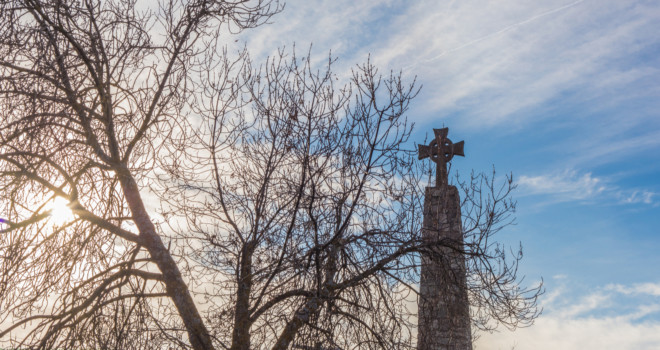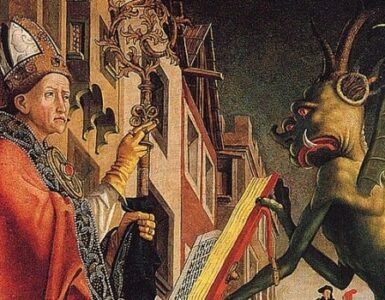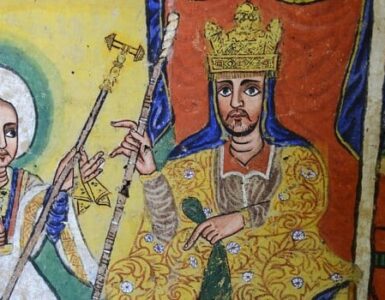Jerry Seinfeld used to do a bit about fear. He would say that someone took a poll, asking people about their greatest fear. And although many people said that their greatest fear was death, the majority of people said that their greatest fear was public speaking. And the punchline is: That means that if you have to go to a funeral, most people would rather be in the casket than have to give the Eulogy!
Well it made me laugh at the time. But the truth is, I don’t
believe it. I don’t believe the premise, that more people fear public speaking
than death. I think the number one fear really is death.
People fear death when this life (or something in it) is their Most Important Thing, and they see death as the loss of their Most Important Thing. But for Catholics and other Christians, this life is not supposed to be the Most Important Thing, and even if we say that life is the most important thing, it’s not limited to this life, and so we take a broader view of life, knowing that life is bigger than this life.
I like to be a mythbuster, especially busting the myths surrounding the first Christian emperor of the Roman Empire — Constantine. One of the persistent myths about him is that he converted the Roman Empire to Christianity, either by force or by fiat. But Constantine didn’t convert the empire — it was already all but done by the time he took the throne, because Christians converted the empire, in part just by loving one neighbor at a time.
But another big part of what converted pagan Romans to Christianity is that they saw the Christians’ courage in the face of death. Many Christians were willing to risk their lives to take care of the sick, even plague victims, and many more were willing to lose their lives rather than deny the faith. And the Romans couldn’t understand why. Why would these Christians risk the Most Important Thing — the enjoyment of this life? And as they continued to observe the Christians hold fast to their convictions, and really live their faith even in the face of death, they realized the answer to their question: Christians did not fear death because they knew that their faith is bigger than life; their God is bigger than life, and life itself is bigger than death. So they were willing, if necessary, to trade in this life, for the life that is bigger than life.
People may say they believe in an afterlife for everyone, or
in a loving God who will accept them no matter how much they reject his will,
but they don’t really live like they believe it. They live like this is all
there is. And death for them is the end of the party. But truth be told, no
matter why people fear death, hardly anyone fears death because they think they
might go to hell.
So what does Scripture say should be our number one fear?
Surprisingly, the Scriptures tell us that the fear of the Lord is the beginning
of wisdom (Proverbs 9:10). So the smartest people fear God. Now that doesn’t
mean we’re supposed to be afraid of God, because God is love, after all. No,
what we are really supposed to be afraid of is the consequences of ignoring God.
That should really be our number one fear.
So there is such a thing as a healthy recognition of our own
mortality and the possibility of judgment. On Ash Wednesday we hear the words, Remember that you are dust, and to dust you
shall return. This is supposed to be a reality check.
But it’s ironic that so many people fear death because they
think it will be the end of the party, and yet Jesus actually described the
Kingdom of Heaven as a party (see the Parable of the Wedding Banquet, Matthew
22). At the same time that people fear death because they love life in the
body, they have bought into the pagan lie that the afterlife is a disembodied
existence.
If the gnostics of the early Church had an Ash Wednesday, they would say this: Remember that you are a god, and someday you will escape the prison of the body and the material world. So many people today actually believe some version of that. And it’s a curious combination of warm fuzzy universalism and pagan gnosticism that gives people today permission to be their own higher power, their own greatest authority — to refuse to fear God, and yet to assume that God will be loving enough to accept them into the Kingdom anyway — and still they don’t want to die because this supposedly loving God is killjoy enough to take away their bodies.
But ashes and dust are not the end of the story. What most people think about the afterlife is actually gnostic — a disembodied existence that diminishes the body as an essential part of who we are as humans, and leads people to fail to care for the bodies of others. Contrary to this, the Church teaches the Christian doctrine of the resurrection of the body, which tells us that at the final resurrection we will be redeemed as whole people, spirit and body. And that’s when the party is just getting started.












